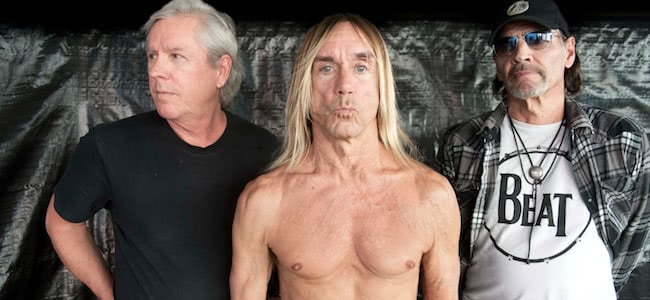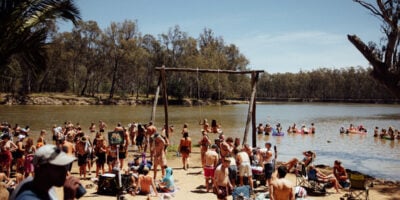It starts off sounding like a fairly standard rock song: a crunchy riff bursting with electricity, played over a solid rhythm section.
But six seconds into the piece, this riff is interrupted by a squealing, frenetic guitar swirl skidding across its surface, and a voice dripping with menace breaks in with one hell of a killer opening line: “I’m a street walking cheetah with a heart full of napalm.”
It’s barely organised chaos – as though the notes have decided to up and play themselves, rules be damned – and it’s genius.
The song is ‘Search and Destroy’, its purpose is to open the landmark proto-punk masterpiece Raw Power, and the man behind the six-string madness that would continue to pummel throughout the entire album, shaking up music as they knew it in 1973, is James Williamson.
A latecomer to the Stooges (he joined the band in time to make Raw Power, their third album), his unique style of guitar playing formed the ideal counterpoint to Iggy Pop’s combative lyrics, and their partnership fuelled the vicious energy of the finest record they would ever make.
“I find that it’s a combination of the two people,” Williamson muses. “I frankly doubt that there’s any other singer or lyricist that I could work with successfully. Because how do you make sense of all this crazy music?”
The asylum perfection of Williamson’s crazy music is almost universally accepted and revered in 2013. “We were over in England at the time when Marc Bolan was red hot, and we were looking at his stuff and thinking ‘hey, we could be like that!’
Johnny Marr, Henry Rollins and Kurt Cobain are among the many musicians that count his work amongst their biggest influences, and it’s largely responsible for the very existence of punk.
Forty years ago however, audiences weren’t so receptive. As Williamson puts it, “the thing just sunk like a rock, and really did not get anything but critical praise for decades.”
Surely the Stooges themselves, though, could recognise the significance of the beast they were creating in Raw Power?
“We hoped so, of course, but we were completely delusional about that,” he remembers, laughing. “We always felt that our music was important and that’s why we did it, but we had no concept of how to be commercial.”
“We were over in England at the time when Marc Bolan was red hot,” he recalls, “and we were looking at his stuff and thinking ‘hey, we could be like that,’ and writing our stuff and just thinking it would take off.”
At the time, it wasn’t to be – but they’re definitely a sellable product now. These days, Iggy and the Stooges can be found jet-setting all over the world, playing big venues and festivals to adoring audiences.
In Williamson’s words, they’re “re-enacting cutting edge,” providing the soundtrack for a whole new generation of kids looking to rebel.
They’re one of the major draw cards of this year’s mammoth Bluesfest lineup, and for those who can’t make the trek to Byron Bay they’ll also be hosting shows in Melbourne, Sydney, and Adelaide.
But Williamson is modest about the enormity of the Stooges’ late-blooming success.
“For me, coming back into the music business, it’s still good that I can even remember how to play!” he laughs.
“What’s fun about it is that [the songs] still hold up,” he continues. “So you’re playing this stuff that you thought you’d given up on – that people didn’t like it – I, personally, had just completely given up on it – and now here you are and it’s very popular really.”
It’s not popular like hip-hop, you know, “ he qualifies, “but it stands in a lot of different age groups, and different people in different socio-economic classes, and so on.”
Given all the festival spots in the 2000s help pay the bills, in the 70s it wasn’t the case at all.
In 1974, the Stooges’ lack of success led to their break up, each member pursuing other goals. “Ultimately we just gave up,” Williamson comments matter-of-factly.
“Iggy went off to Europe with David Bowie to start his solo career, and I just said ‘you know what, I just don’t have the stomach for this business anymore.’”
So, after a brief stint at Paramount as a record producer (it didn’t work out – “I couldn’t stand recording bands day after day that I really didn’t like,”) Williamson found his second calling as an electrical engineer in Silicon Valley.
After studying in California, the former guitarist then became Vice President of Technology Standards for Sony – giving a strange sense of prophecy to the Stooges line “look out honey ‘cause I’m using technology.”
Speaking with Williamson, it must be said that he does sound more like a business exec than a troublemaker, all rolling banter and smooth confidence, with a friendly tone of voice that puts one immediately at ease.
He has clearly evolved from his high school incarnation, when he was sent to a juvenile home for refusing to cut his hair.
“What’s happened in the Silicon Valley was very, very exciting, in a way that really, rock n roll no longer was for me. But it was at one time,” he explains of his career jump.
“It was something brand new, something really, super, exciting,” he continues, still sounding enthusiastic after 25 years in the business. “For me, coming back into the music business, it’s still good that I can even remember how to play!”
“A lot has happened here. The PC, the Internet, all the different things that have happened round here it’s just phenomenal. I don’t regret any of that,” he adds. “It’s been a good ride, it’s been a lot of fun.”
He’s definitely got a pretty impressive resume: Rock star/Record Producer/Silicon Valley Bigwig.
You have to wonder, did the young James Williamson have any comprehension of the trajectory his life would follow? The acclaim, the incluence, the money – is that why he picked up a guitar in the first place?
“I think it was originally a kind of thing where… the coolest guys I knew were in bands and actually, frankly, what I found out early on was that being in bands, the girls would start talking to you,” Williamson admits with a chuckle.
“And so, right away, that became important. One thing lead to another and you know, it’s just fun being in a band,” he concludes simply.
“Sooner or later you have to decide ‘well, okay, how am I going to make a living?’ and I really didn’t have anything that I was any good at except playing the guitar. Luckily for me, some opportunities fell into my lap and so off I went.”
The rest, as they say, is history.
Read our retrospective piece on the 40th Anniversary of Iggy & The Stooges’ Raw Power here. The band’s brand new studio album Ready To Die is due for release April 30, more details here.
Iggy And The Stooges tour Australia this March/April as well as playing Byron Bay Bluesefest 2013, dates and details below
Iggy And The Stooges 2013 Australian Tour Dates
With special guests: The Beasts Of Bourbon
Adelaide – Monday 25th March – Thebarton Theatre
Tix: www.venuetix.com.au
Melbourne – Wednesday 27th March – Festival Hall
Tix: www.ticketmaster.com.au
Sydney – Tuesday 2nd April – Hordern Pavillion
Tix: www.ticketek.com.au
Also appearing: Saturday 30th March – Byron Bay Blues Festival
Tix: www.bluesfest.com.au
Bluesfest 2013 Tickets & Dates
Tyagarah Tea Tree Farm, Byron Bay
Thursday March 28th – Monday April 1st, 2013
Tickets: www.bluesfest.com.au
ph: 02 6685 8310


































